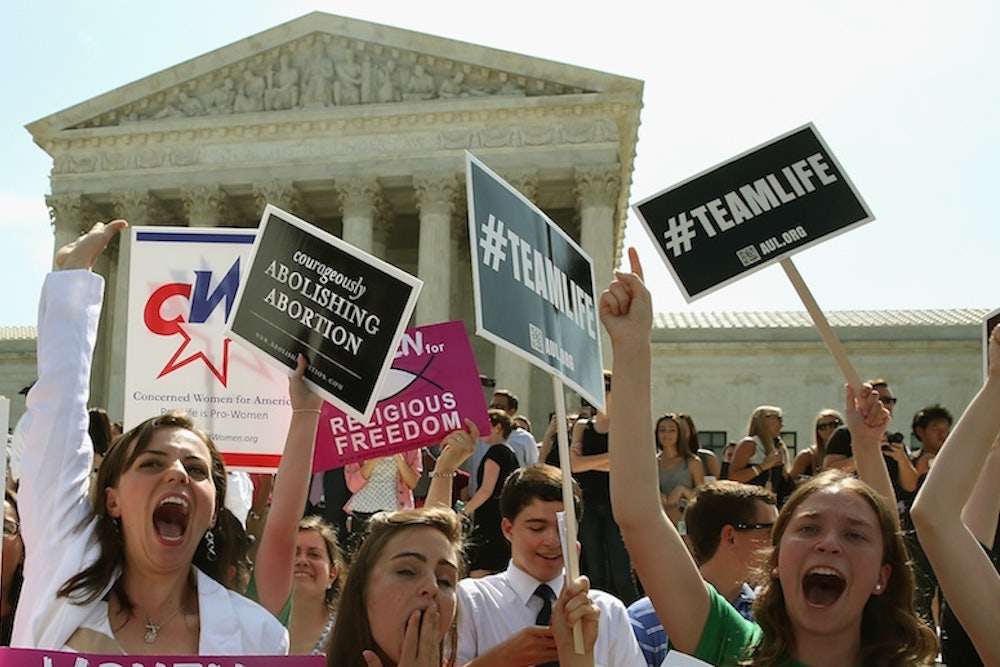In one sense, the Supreme Court’s decision in Hobby Lobby seems less awful than many liberals feared it would be. The majority opinion, written by Justice Samuel Alito, says that the government cannot force closely held corporations to finance coverage of contraception if the owners of those corporations object on religious grounds. The phrase “closely held” is important here. It comes from the IRS and it refers to companies in which five or fewer individuals own more than half the stock. Taken literally, the decision is limited to just those employers. Publicly held companies like Target or United Airlines remain subject to the same Obamacare mandates as before.
But Justice Ruth Bader Ginsburg, in her dissent, called Alito’s opinion a decision of “startling breadth.” There are good reasons to think she is right. According to one 2009 study, about half the workforce is employed by closely held corporations. And unless I’m misreading the opinion, Alito and the four justices voting with him haven’t ruled out expanding the exemption to include more businesses. More important, the ruling establishes a new principle: that corporations can have the same rights of religious belief and expression that individual people do. I'm not a lawyer, but it sure sounds like this could allow them to opt out of other laws they find objectionable, including anti-discrimination laws.
That’d be troubling in any circumstance, obviously. But it’s even more troubling given the way the U.S. social welfare state has evolved.
The fundamental problem here is the way the U.S. has decided to provide its new entitlement to health insurance. In many other countries, the government takes on this responsibility directly, by creating its own insurance program or regulating insurers as if they were public utilities. We do the same here in the U.S., for the elderly, through Medicare. But for the non-elderly, we’ve decided that most working-aged people should get coverage through their employers, with the employers retaining lots of latitude over how to do it.
There are practical and defensible reasons for doing this. It’s how the majority of working-age Americans got coverage before the Affordable Care Act became law; forcing everybody to go onto a new, government-run program would have caused a great deal more disruption. But this arrangement also creates complications. What happens when employers aren’t enthusiastic about providing that coverage—or, as in the Hobby Lobby case, about providing one particular part of it?
Health care is full of decisions that raise complicated ethical questions on which, inevitably, religious beliefs can dictate certain views. It’s not just whether to use certain forms of contraception. It’s also whether to use stem cell therapy, how to treat the end of life, and whether to take blood transfusions. The question is not whether the owners of closely owned corporation have a right to their religious views. Of course they do. The question is whether those views should affect the provision of a public program, enacted in part to promote public health as defined by public health professionals. (Alito, in his opinion, said the ruling would not apply to those other services. Ian Millhiser makes a good case for why that's not true.)
It’s worth remembering that, strictly speaking, the Obamacare mandate doesn’t “force” employers to pay directly for coverage of contraception or any other medical service. The law simply requires that employers bear the burden of medical expenses, broadly defined. They can do so by paying a fee to the government or, if they choose, they can decide to provide insurance on their own. The only caveat is that, if they decide they want to provide insurance, the policies must conform to certain regulations—among them, coverage of so-called essential benefits. And the federal government, relying on the (very sound) judgment of public health professionals, has decided that contraception belongs on the list.
The obvious solution to this dilemma is to take health insurance away from employers altogether. In a very, very limited way, the Obama administration has already done that by arranging for separate contraception coverage, via third party insurers, for churches and other truly religious organizations that object to such coverage. In principle, it could do the same here. And, over the long run, it’s easy enough to imagine a world in which employers were truly out of the health insurance business altogether—a world in which all people got health insurance directly from the government or tightly regulated insurers.
But the people and groups who oppose government's providing insurance directly tend to be the same people who object to the contraception mandate. That’s not a coincidence. While I don’t doubt the religious objections to birth control are sincere, I do think they are masking another belief conservatives bring to this debate: As a general rule, conservatives don’t think government should be compelling them to pay for other people’s medical expenses. Voluntary insurance arrangements are fine, they say. But government shouldn't be making them pay for other people—or for services they might not like, want, or use.
The Hobby Lobby case raises a whole bunch of important and complicated questions—about religious freedom, the definition of corporations, and so on. But fundamentally this is also a case about the responsibility each of us has for the well-being of our fellow man—and, yes, for our fellow woman.
Conservatives think this obligation is a lot smaller than liberals do. On Monday, Alito and four justices of the Supreme Court signaled that they agree.
